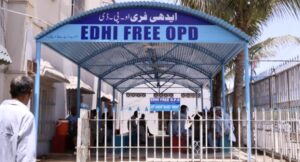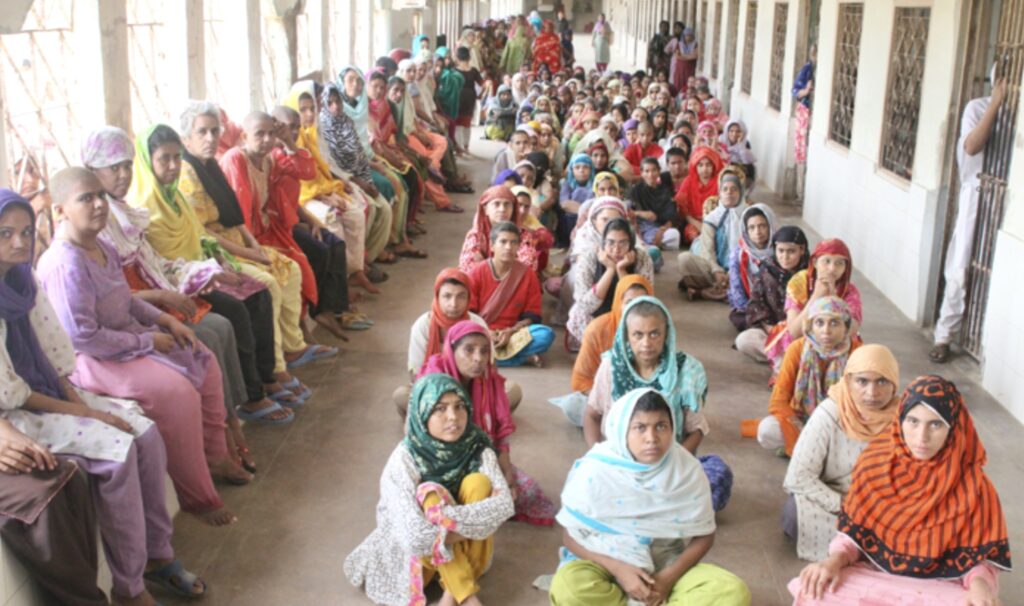(ISLAMABAD – Pakistan) – Faisal Edhi leads the Edhi Foundation, the largest non-governmental organization in Pakistan. Started as a volunteer ambulance service 60 years ago, the Foundation now runs the largest volunteer ambulance network in the world. It’s roughly 5,000 ambulances, two planes, and one helicopter transport people to care after natural disasters and other calamities. The foundation also provides social services for orphans, women elderly people, and the disabled through more than 300 service centers and 6,000 volunteers.
Edhi’s father, Abdul Sattar Edhi, who started the foundation, was later named a Nobel Peace Prize nominee for his charity work.
Edhi talked to The Click about his life’s work and the future of the Edhi Foundation.
This conversation has been edited for length and clarity.
The Click: What convinced your father to start the Edhi Foundation?
Edhi: My father started this organization in 1951 when he migrated to Pakistan from India, and his mother was the one who taught him to work for poor people. She used to give him two paisas [pennies] in Gujarat, India when he was little to spend one paisa on himself and one paisa on a needy person. He would spend both on himself. On his return, my grandmother would ask him where did you spend the other penny? he would say, “I spent both on myself.” My grandmother would scold him that, “you’re taking away the rights of the poor from this young age, I don’t know what you would do when you grow up.” That’s how he started registering that he has to work for the poor from a very young age. Then at the age of 15, he came to Pakistan, he started joining the local community social work organizations and ultimately he started his own charity organization.
The Click: Did you willingly take on the responsibility of the foundation?
Edhi: I was inspired by my father, and I was myself interested in doing this social work. At 13, I was in Karachi and at that time conditions of Karachi were really bad because of political target killings going on. My mother was worried about me. She fought with my father to send me to America for education and adoption. My father gave permission, so I went to Florida and stayed there for two years and one year in New York. I used to sell newspapers in New York on streets to earn my allowance, but I couldn’t finish my high school, and I came back to Pakistan. I was well connected with my father throughout and whenever I would talk to him over the phone, he would always say come back to Pakistan and join me. So, finally, I decided to go back and started working with him since at the age of 17 with my own will.
The Click: Edhi Foundation introduced the charity ambulance service along with other services at the doorstep of the ordinary people for the first time in Pakistan. Can you tell us about that?
Edhi: Locally in Pakistan, at the moment we’re providing all our services in 100 districts, most in majority areas of Pakistan including emergency ambulance service with a network of services of Edhi homes for orphans, women who face domestic abuse, old-age homes for senior citizens, child adoption centers in which unwanted or abandoned babies are given to

Free Edhi clinical services for Out Patient Department Credit: Edhi.org
us, and we give them for adoption to suitable families. Currently, we have 5,000 people staying in our Edhi homes.
The Click: Do you admit people to your Edhi Centers regardless of race, religious affiliation, or social status?
Edhi : We give services beyond any religious caste, creed, or anything. We don’t ask for their identity [or] background. If somebody comes to us for help we provide them help without the identification.
The Click: How do you deal with the individuals who suffered trauma? Do you have counselors to treat them?
Edhi : It depends. If somebody gets help in our Edhi homes, our local staff give them counseling. Mostly girls come to our shelter homes due to local domestic violence and mental [abuse]. Our main responsibility is to negotiate with their parents and relatives, and we try to return that girl or their children to their families. We don’t go into the legal matters because they are very expensive [and] lengthy, so we try our best to mediate effectively.
The Click: Do you provide skills training to the people in your shelters?
Edhi : We provide different types of teachings and skillsets like stitching, sewing and mechanical training to girls and boys. We also have [ a] hospital, a midwife training and a nursing center to train and certify them and send them back to society as an honorable citizen with the certification of nursing and midwives. We are also working to establish an advanced IT and technical school this year for the public and also for people in Edhi homes.
The Click: What is the outlook of the Edhi organization in the next 10 years?
Edhi : I’m working on new services, especially educational services and hospitals in different fields, and this year we’ll be doing many new projects and people are supporting us all over. I hope we will be successful in those new services. The educational services I’m working on are IT and technical education including automobile workshops, mechanical workshops, computer workshops, and different other trades in which we’ll be training people according to their interests.


